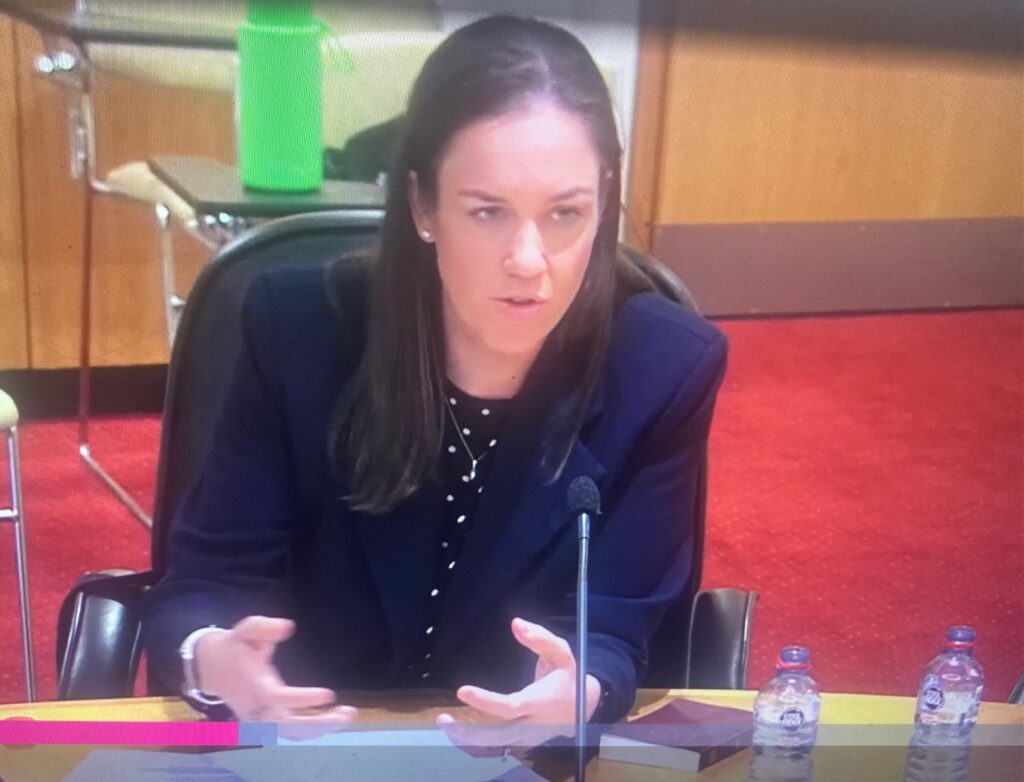Elsie Blay (2006) Is On A Mission

Elsie Blay (Bowd-Williams) graduated from Santa Maria College in 2006. She is the General Manager of Housing and Homelessness at Ruah Community Services. Elsie shares her story with us and her inspiring journey moving from acute care to supporting the most vulnerable in our community.
How long have you been involved with Ruah?
I have worked with Ruah for five years in a range of roles. I began consulting and then moved into service design and project management. I also led our strategy and projects portfolio. I am now loving a more operations-focused role, working in our housing and homelessness team.
What does your pathway from Santa Maria to Ruah look like?
I left Santa Maria in 2005 and launched into nursing. This brought many travels to Timor, India, Uganda and the USA. I studied biomedicine and then did a master’s in public health, focussing on health economics.
People are complex, and I found the intersection between their lives and their health most fascinating. Whether in a small village in Timor or a pumping emergency department, people need the same things to be connected and well. Early on, I was drawn to the root cause of ill-health and social inequity.
I went into roles focussing on service model design and implementation, health project management, academia, and some consulting work before landing with Ruah. I worked in project management in health across Australia, implementing exciting new projects in community health and acute care. When my kids were born, I did some lecturing at uni and tutored in health ethics and governance. I loved that and working with the energetic and thriving students!
What was the catalyst for moving into a non-client-facing role?
As a young nurse, I used to work in the clinics and see people come in with vascular disease or injuries from self-harm. We would assess them, treat them and send them home. A few months later, they were back again. As a very green and probably naive graduate, I couldn’t figure out why we were doing short-term fixes. Why weren’t we addressing the real problems, the underlying causes? We need to be addressing why they get sick. We need to focus on acute care and prevention. I understood that the underlying issues are often far more complex and timely to address. It was like a lightbulb moment for me (although very obviously looking back).
What is the most rewarding thing about working for an organisation that gives back?
Absolutely, the people we support – working with people to improve their health and their family lives. The stories we hear about their success stories drive me.
It’s important to me that we do the work to reassess our assumptions about why people find themselves in disadvantaged situations. This problem is not a them problem, but an us problem. As a society, we need to do better and work together across all sectors to better address the inequalities and health and social disadvantage.
Working with a dynamic, dedicated and clever team is another huge driver. We have incredible leaders who think big and are always planning how we can do more and provide excellent services for people most in need.
What drew you to Ruah and to leave your nursing career?
I really haven’t left nursing at all. While not on the front line, I am working every day to fight for people who experience social inequity and co-morbidities. The people my team support have multiple and complex health needs. I was drawn to solve upstream solutions from working in an emergency department, seeing the multiple challenges people experience in navigating their physical health. When people come into acute care, there is often much behind it, which is where the real work is.
I was really motivated from my years in nursing to bridge the gap between research and practice. Working with incredible teams who use research findings to inform policymakers and influence policy development and implementation has been incredibly rewarding.
My initial motivation to move into the policy space was to advocate and lead the community services sector to develop holistic, wrap-around support services designed to address the complex drivers of homelessness and meet the needs of those experiencing or at risk of becoming homeless. I really love what I am doing!
What does your role at Ruah involve?
As the General Manager at Ruah, I am outward-focused on strategy and looking at how we can continually extend our offering to the people we support. I oversee our dynamic and thriving operations team. We have a wide range of outreach services, engagement hubs and drop spaces. We support people where they are at. My role is focused on leading the strategy for the team and working to ensure we deliver the best possible service to the people who need it most. My role focuses on designing and implementing new services, governance, business development, future business planning and partnerships within the sector.
Did your time at Santa Maria influence your direction when you left school?
Over my years at school, I remember hearing ‘the true measure of any society can be found in how it treats its most vulnerable members‘. This is everything! And focuses on what matters and what we are working towards.
Santa Maria had a huge impact on me. It showed me the importance of supporting those most vulnerable and leaving the world a better place than we found it. I was involved with Young Mercies at St Pat’s in Fremantle and now work closely with them. These experiences were really instrumental in my career.
Supporting people with disabilities was also impactful work that shaped my career. Those experiences will be with me as I continue to remember why our work is so important.
I loved my days at Santa Maria so much. Such good people and great leadership. A very lasting impact.
What has been the biggest challenge in your career so far?
The biggest challenge is always the unmet need, the flexibility and creativity of people working in this space never cease to amaze. Still, there are inadequate resources to meet the need.
Seeing people just like me who have had one or two things unravel in their life. Young people, mums with kids who are leaving a relationship that has become violent, people supporting loved ones with a disability. Seeing this every day – people you can really relate to, and they just have no options. It’s so tough. This drives me to want to make the system work so they don’t have to spend their whole day looking for support.
What has been the biggest highlight in your career so far?
My current job is the highlight so far, and every day is better than the last. Which is why I am still here and loving every day.
Leading through COVID-19 has stood out as a highlight. The importance of looking after our teams and prioritising people hit home. When the teams were under incredible pressure from the unknown, what mattered most was all of us working with empathy and engaging with people to understand their concerns. It gave real clarity to understand what matters most for our staff and the people we support. Giving some sense of certainty was really important during what we were expecting to be a huge crisis in the sector.
There was never a greater need to be responsive and fluid to the dynamics of an evolving crisis. We were supporting people who had no way to isolate, no transport and were often unsure of what they needed to be doing to stay safe. People were really scared. It was incredibly rewarding planning and working with the sector and our teams to ensure the community was safe and as prepared as we could be. Looking back, this experience gave me a lot of perspective.
Thank you for sharing your story Elsie and an insight into the plight of those less fortunate.

With Laurissa Knowles From Valley Depths to Mountain Peaks (1993)
Laurissa Knowles (1993) has had an incredible career journey so far, from Santa Maria College Teacher to Celebrant and Councillor.

Elevating Spaces: Diana Ellis’ Signature Touch & Architecture Magic
What happens when you mix a love for art, travel, nature, and creativity with construction and building? You get the essence of Diana Ellis’ career!

The Power of Expectations in Shaping Student Success – Jennifer Oaten
Discover the transformative impact of expectations on student success. Learn how belief shapes outcomes in education and beyond.
- Alumnni, Featured
Author: Santa Maria College
Santa Maria College is a vibrant girls school with a growing local presence and reputation. Our Mission is to educate young Mercy women who act with courage and compassion to enrich our world. Santa Maria College is located in Attadale in Western Australia, 16 km from the Perth CBD. We offer a Catholic education for girls in Years 5 – 12 and have 1300 students, including 152 boarders.






